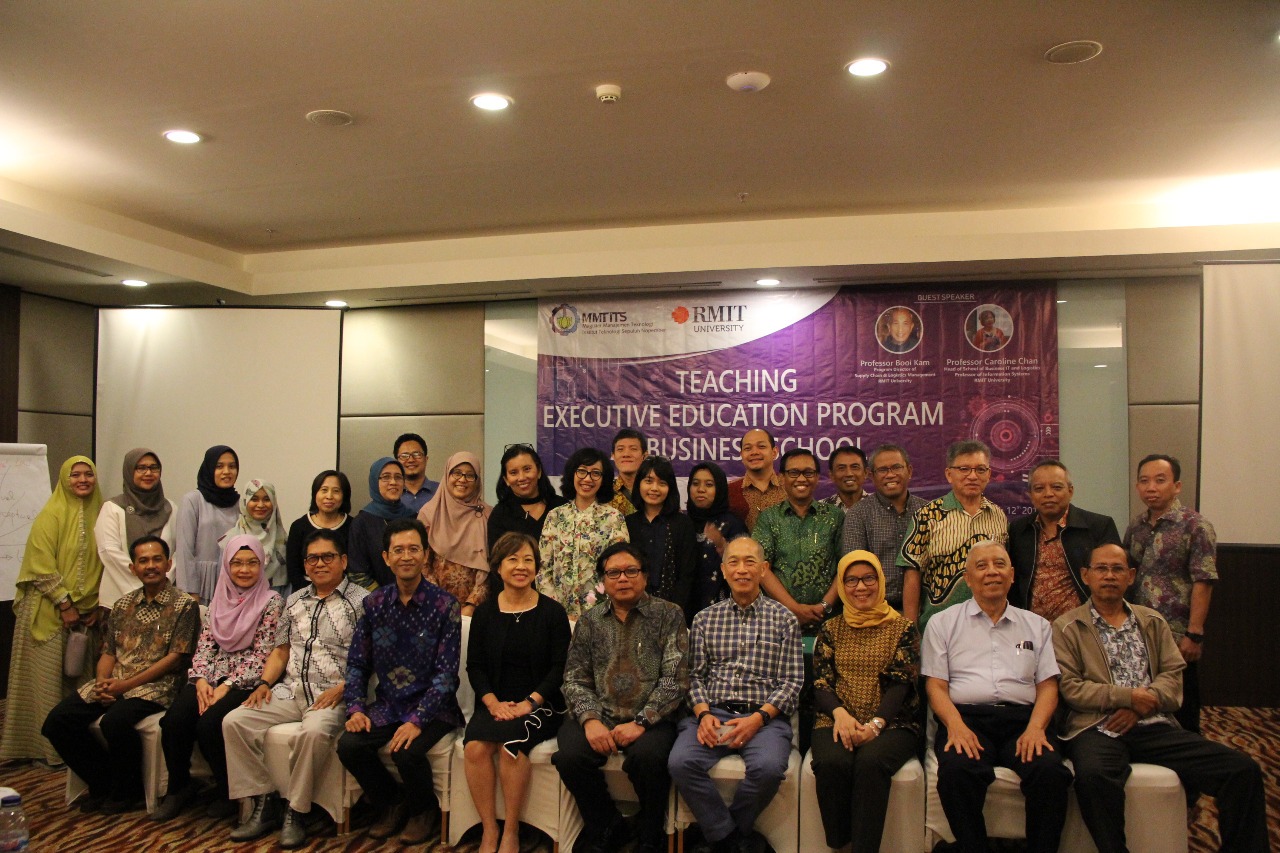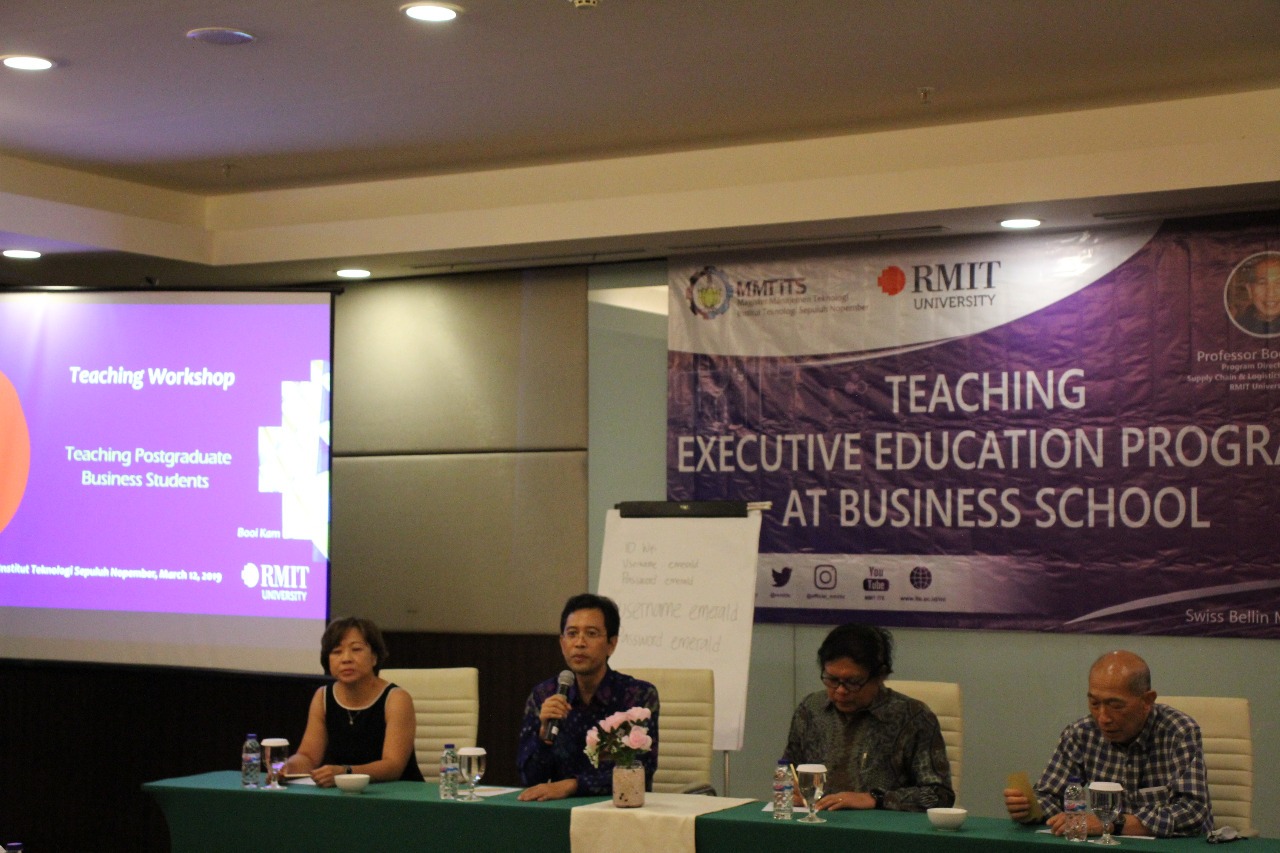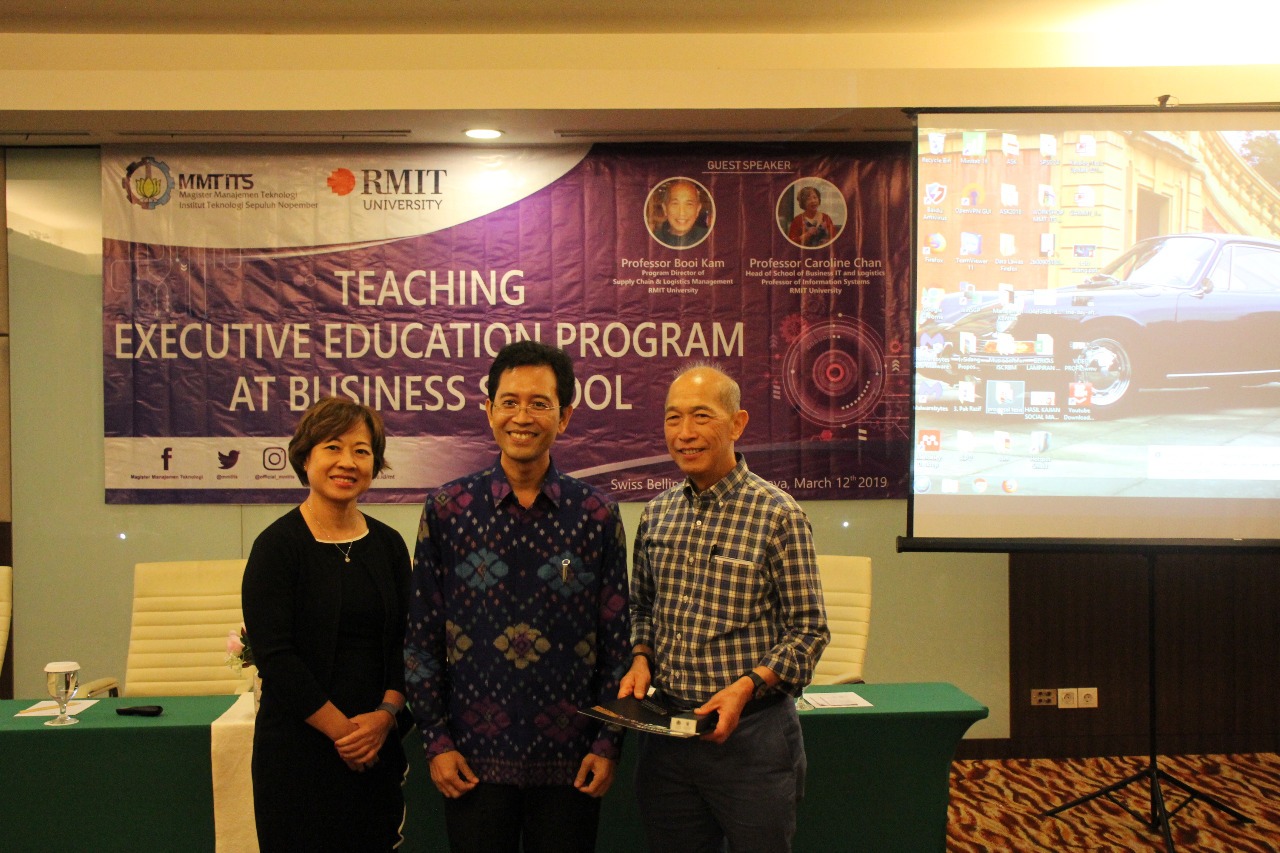To Increase Lecturers Ability, MMT ITS Invited Professor from Australia

Both professors from RMIT University together with MMT ITS lecturers
ITS Campus, ITS News – To further enhance the teaching ability of its lecturers, Technology Management Study Program (MMT) of Institut Teknologi Sepuluh Nopember (ITS) Surabaya invited two professors from the Royal Melbourne Institute of Technology (RMIT) University, Australia. The activity in the form of a seminar entitled Teaching the Executive Education Program at the Business School was held at the Swiss Belinn Manyar Hotel, Surabaya, Tuesday (12/3).
The two professors were Prof. Caroline Chan, an information systems professor, and Prof. Booi Kam, Director of Logistics and Supply Chain Management Programs at RMIT University. This seminar invites MMT ITS lecturers to discuss and introduce various types of teaching that have been conducted by RMIT University in management study programs.
The Dean of the Faculty of Business and Technology (FBMT) Prof. Ir Udi Subakti Ciptomulyo said it is important for teachers to have good experience and quality of teaching to produce students with high skills. Moreover, teaching in the field of management needs to have a pretty good understanding and a lot of times in solving existing problems (study cases). “The problems that occur in the industry varied, therefore each problem has a different solution,” said the lecturer who is usually called Udi.
Meanwhile, Prof. Booi Kam explained that in the education field, the more teachers explain, the more students learn from the teacher. This term is very popular, but in its application, the more teachers explain it is not necessarily the more students learn. That also applies the opposite. “Because not every student has the same understanding,” he explained.
Booi said that the knowledge learned in the world is divided into two types, conceptual knowledge, and factual knowledge. For conceptual knowledge, Booi exemplifies the line that is constantly rising in the cartesius diagram. The Y axis is likened to the teacher’s teaching ability and the X-axis is the lesson that students get. “In teaching conceptual knowledge, the more teachers explain, can add insight to students,” he explained
Booi said conceptual knowledge can be known as hard science. The nature of this conceptual knowledge is already patent. Most have been found in ancient times with the right formula. In addition, people who study this can be said to be passive learning. “Factual knowledge can be studied carefully, referring to studies that already exist or can be considered as concepts,” he said.

(from left) Prof. Caroline Chan, Prof. I Nyoman Pujawan, Prof. Udi Subakti, and Prof. Booi Kam
Whereas factual knowledge, according to Booi, is a knowledge that always develops rapidly. Booi gave an example with a line that slowly rose in the cartesius diagram. To reach a learning point that is very well understood by a student, more effort is needed by the teacher in teaching. “In teaching factual knowledge, the development of science is very fast, therefore it must refer to current events,” he explained
Booi continued, factual knowledge can be known as soft science. Its nature is uncertain, changeable, requires high creativity in solving the problem. In addition, people who study this can be said to be passive learning. “Factual knowledge is always changing. “The challenge for lecturers and students is to solve the latest problems or study cases,” he continued
This factual knowledge will be studied by management students. A concrete example, namely in completing the study case of problems that are always changing. The hope is that students are able to solve various management problems in both large and small industries. “Therefore, it is important to have a study case exercise for MMT students,” he said
For the teaching process at RMIT, Prof. Caroline Chan explained, the learning model at the university was in sequence. Every student only takes one lesson every six weeks, nothing more. After the sixth week, students can take other subjects. Within one year, one student can take up to six subjects for a total of 36 weeks. “This method is effective in focusing students’ thinking in one learning period,” he said.
Caroline said the type of good learning is not always monotonous. Sometimes lecturers must be able to invite students to see the industry. Also must be able to invite students to be more open-minded about the development of management in the future. “In addition, lecturers must be able to bring industrial problems into the classroom,” he explained.
The Head of MMT ITS Department Prof. Ir. I Nyoman Pujawan MEng PhD said, with this seminar, it was expected that MMT ITS lecturers would be able to learn teaching techniques better. Nyoman also hopes that in the future MMT ITS will be able to implement one of the teaching techniques brought by the two professors from RMIT University. “We want to improve the learning pattern, especially with the online model and bank case study to help students learn,” he concluded. (qin / Anjani / ITS Public Relation Officer)

(from left) Prof. Caroline Chan, Prof. I Nyoman Pujawan, and Prof. Booi Kam
Related News
-
Facilitating Creativity of Students, ITS Information Systems Department Presents CCWS
ITS Department of Information Systems students conduct a discussion in one of the available spaces in the ITS Digital
March 15, 2019 17:03 -
ITS Explores Electrification Cooperation with PT Vale Indonesia
ITS Campus, ITS News — Following up on the Memorandum of Understanding (MoU) with PT Vale Indonesia, Institut Teknologi
March 15, 2019 17:03 -
ITS Reaches Top 7 BRIN Collaborators with 309 Scientific Publications
ITS Campus, ITS News — Institut Teknologi Sepuluh Nopember (ITS) continues demonstrating its commitment to strengthening collaboration in research
March 15, 2019 17:03 -
The Only One from Indonesia, ITS Student Becomes Erasmus+ Scholarship Awardee
ITS Campus, ITS News — Civitas academica of Institut Teknologi Sepuluh Nopember (ITS) has once again contributed to making
March 15, 2019 17:03
